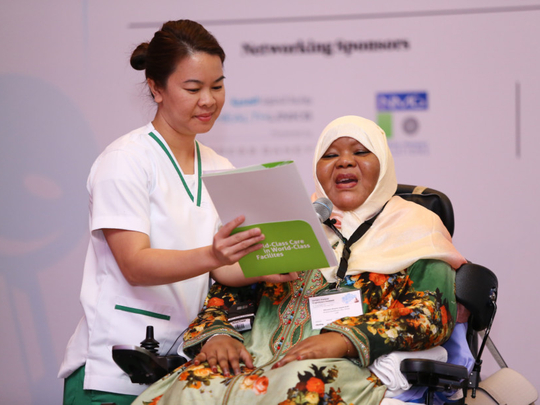
Abu Dhabi: She needs 24-hour assistance and is confined to a wheelchair, but Maryam Al Ali is diligently working towards her dream. The 53-year-old Emirati patient with muscular dystrophy is now very close to memorising the Quran.
“After being diagnosed with muscular dystrophy as a 15-year-old, I was unable to finish my higher education. But now I feel like I am finally achieving my goals,” Al Ali said at the first GCC Patient Experience Summit in the capital on Monday.
Al Ali is a patient at one of the Abu Dhabi Emirate’s long-term care facilities, Amana Healthcare Medical and Rehabilitation Hospital. These facilities will soon be ranked in terms of their quality standards, a senior official at the Abu Dhabi health sector regulator, the Health Authority Abu Dhabi (Haad), told Gulf News on the sidelines of the summit.
“We have been monitoring and ranking the emirate’s hospitals since 2014, and we have seen quality standards improve greatly, especially in terms of the timeliness of care and patient communication. Now, we are working with six long-term care facilities and 103 homecare service providers to similarly rank them, and we will soon set up the same system for clinics,” said Salama Al Hameli, senior analyst for quality and monitoring at the Haad.
There are currently 43 hospitals in the emirate, and quality standards at these have been monitored since the introduction of the Haad’s Jawda quality index three years ago. Only a portion of the rankings have been released so far, but this is soon set to change. As reported by Gulf News last month, Dr Maha Barakat, director general at the Haad, has said that the comprehensive rankings are expected to be published in 2018.
“Quality standards are a top priority at the Haad. When applied to homecare service providers and long-term care facilities, we want to ensure that the quality of care they provide mirrors the high level of care provided at hospitals. We want to stress that these health care providers must take as much responsibility of patient outcomes as hospitals,” Al Hameli said.
Al Ali, who has been a patient at Amana Healthcare for nearly three years, appears happy with the level of care she is receiving. Assisted by a nurse, Al Ali spoke to the audience of health care professionals and industry experts, receiving a standing ovation at the end.
“The number of medically complex patients (those with multiple medical needs and functional challenges) is growing in the UAE, as many patients who face paralysing injuries or develop degenerative diseases survive for a long time due to the high level of health care available. For these patients, we try to provide tools to enable communication, mobility and a high quality of life,” said Lulu Hamdan, health care technology specialist and communications manager at Amana Healthcare Medical and Rehabilitation Hospital, which has 160 beds between its two facilities in Abu Dhabi city and Al Ain. She illustrated the case of a 30-year-old Emirati who could only move his eyes, and how he was eventually able to communicate with those around him using eye tracking technology.
Another major indicator measured by the Haad is patient satisfaction, and Al Hameli said that patients appear most satisfied with the level of care provided by mid-size private hospitals.
“We surveyed about 46,000 patients between November 2016 and February 2017, and it appeared that the highest levels of satisfaction were recorded at private sector hospitals with 50 to 150 beds. We were glad to note, especially, that the level of satisfaction with Abu Dhabi hospitals’ outpatient and emergency care was higher than the level of patient satisfaction recorded using similar tools in developed countries like Singapore and the United Kingdom,” she added.












